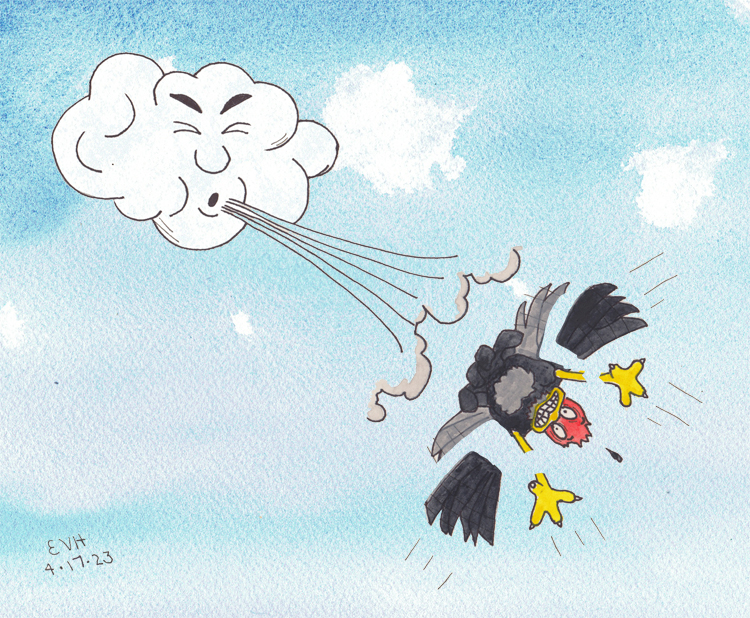
Jataka 427
Gijjha Jātaka
The Vulture
as told by Eric Van Horn
originally translated by H.T. Francis and R.A. Neil, Cambridge University
originally edited by Professor Edward Byles Cowell, Cambridge University
This story may sound familiar. It is almost identical to Jātaka 381. It has two themes. The first one is to respect and pay attention to those who are wiser than you are. This is a recurring theme in the Buddha’s Dharma. He even gives some rather detailed instructions on how to tell if someone is wise enough to be entrusted with being a teacher. One of his more famous discourses on this topic is “The Shorter Discourse on the Simile of the Elephant’s Footprint,” which is Majjhima Nikāya 27.
But this story also follows another familiar theme, and that is knowing your limits. This is, of course, a tricky subject. You don’t want to unnecessarily discourage anyone. Almost all of us are capable of more than we can imagine, especially in Dharma practice. But there are also realistic limits, and we need to know how and when to stay within those. Life offers some harsh lessons if we do not use our wisdom and discernment when it comes to what is possible and practical.
“Formed of rough logs.” The Master told this story while he was at Jetavana. It is about a disobedient monk. He was, they say, of gentle birth, and although he ordained in the Dharma that leads to salvation, he was admonished by his well-wishers, masters, teachers, and fellow-students to this effect: “In this way you must advance and in this way you must retreat. Look at or away from objects in this way. This is how you must stretch out your arm, and this is how you must draw it back. This is how the inner and outer garments are to be worn. This is how you should hold your bowl. And when you have received sufficient food to sustain life, after self-examination, this is how you should eat it, keeping guard over the sense doors. In eating you are to be moderate and exercise mindfulness. You are to recognize your duties towards monastics who come to or leave the monastery. These are the 14 sets of priestly duties (the Khandhaka section in the Vinaya) and the 80 great duties to duly performed. These are the 13 Dhuta (Dhutanga) practices. All of these are to be scrupulously performed.”
And despite this instruction, he was disobedient and impatient. He did not receive instruction respectfully but refused to listen to them, saying, “I do not find fault with you. Why do you criticize me? I know what is for my good and what is not.”
Then the monks, hearing of his disobedience, sat in the Dharma Hall discussing his faults. The Master arrived and asked them what it was they were discussing. He sent for the brother and said, “Is it true, brother, that you are disobedient?” And when he confessed that it was, the Master said, “Why, brother, after being ordained in so excellent a Dharma that leads to salvation, do you not listen to the voice of your well-wishers? Formerly, too, you disobeyed the voice of the wise and were blown to bits by the Veramba wind.” (“Veramba wind” is named for a sea from which the wind comes.) And then he told this story from the past.
Once upon a time the Bodhisatta was reborn as a young vulture on Vulture Mountain. Now his offspring Supatta, the king of the vultures, was strong and lusty, He had a following of many thousands of vultures, and he fed the parent birds. And owing to his strength he could fly a very great distance. But his father admonished him and said, “My son, you must not go beyond this point.” He said, “Very well.” However, one day when it rained, he flew up with the other vultures, and leaving the rest behind, he flew beyond the prescribed limit. There he came within the range of the Veramba wind, and was blown to bits.

Figure: Blown to bits!

In order to illustrate this incident, the Master—in his Perfect Wisdom—uttered these verses:
Formed of rough logs, an ancient pathway led
To dizzy heights, where a young vulture fed.
The parent birds, lusty and strong of wing,
He would to them fat serpent and food bring.
And when his father saw him flying high
And venturing far afield, he thus would cry,
“My son, when you can see from your lookout
Earth’s rounded sphere by ocean girt about,
Go no farther, but straight return, I pray.”
Then would this king of birds speed on his way,
And bending o’er the earth, with piercing sight
He viewed below forest and mountain height.
And earth would, as his sire described, appear
Amid the encircling sea a rounded sphere.
But when beyond these limits he had passed,
Strong bird though he might be, a raging blast
Swept him away to an untimely death.
Powerless to cope with storm-wind’s fiery breath.
Thus did the bird by disobedience prove
Fatal to those dependent on his love.
So perish all that scornful of old age
Deride the warnings uttered by the sage,
As the young vulture Wisdom’s voice defied
And scorned the limits set to bound his pride.

“Therefore, brother, do not be like this vulture, but do the bidding of your well-wishers.” And having been admonished by the Master, from then on he became obedient.
The Master, his lesson ended, identified the birth: “The disobedient vulture of those days is now the disobedient monk, and I was the parent vulture.”
